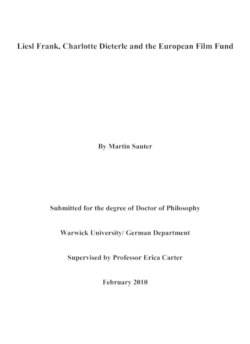Liesl Frank, Charlotte Dieterle and the European Film Fund

Реклама. ООО «ЛитРес», ИНН: 7719571260.
Оглавление
Martin Sauter. Liesl Frank, Charlotte Dieterle and the European Film Fund
Liesl Frank, Charlotte Dieterle and the European Film Fund
Abstract
List of Abbreviations
Chapter One. Introduction
Early Histories of Exile in Hollywood and the United States
Autobiographies and Biographies
Studies on Film Exile
Jan-Christopher Horak
Helmut G. Asper
Existing Gaps
Methodology: Archival Research
Biography and Exile History
Footnotes
Chapter Two. The European Film Fund: Its Foundation and Background
The Founding of the European Film Fund
The Name: A Result of Anti-Semitism?
Aims and Purpose of the EFF
Functions and Duties of EFF Board Members
Liesl Frank and the Émigré Community
Charlotte Dieterle and Philanthropy
Footnotes
Chapter Three. Financial Administration: Donations
Financial Administration
Donations
Donor Groups
Case Studies
Fritz Lang - An Unlikely Benefactor?
M.C. Levee and the Jewish Emigré Network
Lion Feuchtwanger - A Study in Political Solidarity
Walter Reisch - A Forgotten Success Story
Footnotes
Chapter Four. Financial Administration: Disbursements
Groups of Beneficiaries
Theatre Artists
Writers
Actors
Directors
Below-the-Line Personnel
EFF Beneficiaries Overseas
Blandine Ebinger - An Emigré Without a Community
Leonhard Frank - The Outsider
Alfred Döblin - Destitute Without the EFF
Max Ophüls - From Beneficiary to Donor
Footnotes
Chapter Five. Non-Financial Support: The EFF and the ERC
Legal Support and Immigration: Official Structures and Networks
The Emergency Rescue Committee
The Collaboration Between the ERC and the EFF
Liesl Frank and Charlotte Dieterle: Providing Emotional Support and Practical Help to Refugees
Footnotes
Chapter Six. The Demise of the EFF
Collection of Loans
The European Literary Fund?
The Crisis of 1945
The Liquidation
Coda
Footnotes
Bibliography:
Filmography:
List of Archives and Libraries: Germany
Отрывок из книги
Liesl Frank, Charlotte Dieterle and the European Film Fund
By Martin Sauter
.....
When Horak and Asper wrote their article, Horak was head of the archives at Universal Studios, and thus had unrestricted access to the studio’s archives and records. Horak and Asper convincingly show how ‘three refugees from Adolf Hitler’s Germany [Henry Koster, Joe Pasternak, Felix Jackson] adapted themselves to the working methods of the studio system, while at the same time bringing to bear their European heritage. In doing so, they not only influenced briefly the formation of a major American film genre, the musical comedy, through the discovery and nurturing of a young star [Deanna Durbin], but in the process also literally saved a major Hollywood studio, Universal, from certain bankruptcy’ (Asper & Horak 1999: 135). Asper and Horak draw interesting parallels between the light, musical comedies Koster, Pasternak and Jackson had made in Europe and their subsequent Deanna Durbin musicals at Universal, showing that the latter were a continuation of the former, the only significant difference being that their star had now changed as the primary stars of their European output, Dolly Haas and Francisca Gaal, were now replaced by Deanna Durbin. The article also illustrates compellingly how the blueprint of Koster, Pasternak, and Jackson, since it had proven so profitable, was emulated by studios such as MGM. For all we know, the MGM musicals of the 1940a and 50s would not have been the same without the influence those three émigrés had on Hollywood’s film industry.
As many émigrés were still alive when Horak first embarked on exile research, he was able to rely on first-hand accounts. These oral histories, as we have seen, were Horak’s initial contribution to the field. Also, by shifting the focus away from the émigrés themselves to their creative output, he opened our eyes to the mark they left on the film industries of their host countries. Horak was also the first to clearly define exile film, thus narrowing the area of investigation from a plethora of films to which a number of émigrés contributed in varying degrees, to those films in which the input of the émigrés is distinctly discernible. In addition, he redefined the concept of national cinema, concluding that in the light of the substantial émigré contribution, the boundaries and the definition of German national cinema become blurred and thus are open for debate. Lastly, by looking at the contribution of cinematographers to (exile) film, Horak opened the field of vision beyond directors, screenwriters and actors to below-the-line personnel.
.....